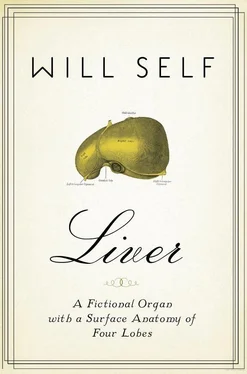‘That’s the one!’ cried Prometheus. ‘That rusty fucking tap is gonna spurt out dosh — you’ll see. Whack it down on a clear black field.
Do it dripping — then pouring, then fucking gushing. Always the same line. Big type: BETTER THAN TAP. Got it?’
Epimetheus gets it. He gets it bad.
There had been no preambles at his flat — a purpose-built New York loft next to Tate Modern. Pandora walked in, slung off her coat, shucked off her dress, stepped down from her shoes and fell out of her bra. Over her bare shoulder the floodlit dome of St Paul’s boiled up: the mushroom cloud of the baroque. A split-tailed mermaid in her metallic tights, she flipped over the thirty-five feet of varnished floorboards to where Epimetheus’s bed — a post-industrial slab of bolted-together railway sleepers — dangled by chains from the rafters and, without any ado, mounted it.
Then she had to mount Epimetheus, who, on joining her, discovered that he had no equilibrium at all. If he sat up, the bed’s modest revolution threatened to topple him; even supine he couldn’t keep his balance sufficiently to lay his hands on her. Pandora didn’t appear to mind. She fetched the cocaine wrap from her bag and administered another line to them both. Then she coaxed his irrelevant nub with scarlet lips and delved with trowel of tongue, until it was significant enough — just — to penetrate her labia.
A Swiss Railways clock blooms on a silver stalk that bends over the rubbery allotment of the Titan offices. Its hands shiver to 10.57. The rest of the work spore have wafted in by now — account planners, researchers, secretaries and those eponymous heroes, the creatives. The creatives take to their pits and pods, and there they’re brought printouts, or publications, or croissants — all by way of nourishment.
Prometheus says, ‘I need a leak.’
‘I’m not bloody surprised,’ Epimetheus mutters.
Titan’s toilets are well appointed: the floors covered with quarry tiling, the sinks hewn from granite blocks, the urinals old Corporation of London horse troughs. The stalls, walled floor to ceiling, are equipped with the oak doors that once graced a Wren church in the City. Prometheus goes directly to the one at the far end, which is in the corner of the building and has its own window. Once locked inside, he takes out a key, unscrews the window locks, places them carefully on the sill and pulls up the bottom panel. He takes off his sack of a jacket and hangs it from the hook on the back of the door, then he drops his baggy trousers and his baggier silk boxers. He sits down on the commode and yanks up his jersey shirt, baring his narrow, almost hairless chest. He half turns to the window and bends forward, warping his long back.
Prometheus’s ribcage expands under taut white skin; piss hisses in the bowl. His face is aimed at the stall’s corner: he stares where tile, wood and masonry join.
Twenty-five thousand feet above Old Street a griffon vulture circles in the freezing air; twenty thousand feet below her a grey-brown lagging of cloud covers the city. The vulture’s gyre takes her from Ilford in the east to Hayes in the west, from Potters Bar in the north to Carshalton in the south. Her bald white head, skull-like brow and double-curved beak are angled not down — for there is no carrion to be seen — but straight ahead. The bird is in a holding pattern; her buff wing coverts and darker flight feathers riffle in the slipstream; her short, stubby tail is tilted, rigid as a rudder.
Way down there Prometheus strains, shackled to his ceramic rock. Mysteriously, the vulture responds to this contortion from eight miles away. She tucks in her huge wings and slides sideways, plummeting to cloud level in less than a minute, then slicing through the vaporous wrinkles as surely as a surgeon’s scalpel cuts through skin.
At once, the city is torn open for the vulture’s gaze: a mass of viscid interiority, with its vital organs of governance and commerce, its sinews and arteries of communication, its intestinal retail concourses and media glands, and surrounding them all its myriad cells of human habitation.
Down and down the vulture swoops, then brakes, her wings wide and cupped. She sees the tumour of the Swiss Re tower, the tapeworm of the Thames, the fatty deposits of Broadgate and the Barbican, the sphincter of the Old Street roundabout. Buffeted, slipping to right and left, the vulture slides through phone and power lines, manoeuvres beautifully between a fire escape and a wall, then glides up to stoop on the sill of the window Prometheus opened five minutes before.
The creative stares at the vulture, and she examines him in return with eyes that have black pupils and yellow irises. Her countenance is utterly inhuman, yet possesses calm wisdom and complete understanding. The vulture’s manifestation is terrifying: her wingspan is fully eight feet, and she stands as tall as a toddler. Her beak is perfectly designed to scythe, then rip; her ruff of white feathers cannot be anthropomorphized into Elizabethan courtly apparel and looks exactly like what it is: a sponge to sop up the blood of carrion.
She arches her muscular neck to gain entrance and comes into the toilet stall with dispatch, although careful not to create any noise or disturbance: a busy surgeon walking into a confined and cluttered operating theatre. Prometheus cants forward still more, so that every vertebra is clearly delineated. He bites the toilet roll. The griffon vulture spreads her wings with a scratchy rustle — the avian stench, musty, nitrous, is gassily pervasive — then abruptly lunges, plunging her beak under the lip of Prometheus’s costal cartilage. With a sawing motion of her head, the vulture opens a ragged tear in him, revealing the glossy maroon mass of his liver. Then, without ado, she starts gnawing.
The adman makes no sound except a faint groan, easily interpretable, from without, as the labour of excretion.
*
He’s visualizing a Sunday lunch in Middle England. Dad and two kids are at the table, while through the French windows we can see a trampoline standing on two tones of green lawn. Mummy gets up from the oven, her floral mitts gripping a sizzling pan. Dad and the kids are telegenically salivating, cutlery at the ready, when the French windows burst inwards. What’s up there in the blue, blue sky? A swarm of bees? A cyclone? No it’s a squadron of vultures in close formation.
One after another, they swoop into the kitchen and land on the table, their reptilian feet sullying the tablecloth. The happy family’s grins somersault into girns — then they recover themselves; for these aren’t real vultures, they’re cartoon figures that link wings-for-arms and dance up and down, skilfully avoiding the dishes of roast potatoes and carrots, the beakers full of fruit juice and the sturdy earthenware plates.
The vulture chorus sings: ‘Don’t give Dad ’n’ the kids fat ’n’ bones, fat ’n’ bones, fa-at ’n’ bo-o-ones! Only give ’em a tummy fulla flesh, a tummy fulla flesh, a tu-mmy fulla fle-esh!’
One of the vultures breaks from the line-up and hops into the air to hover over the roasting pan. It grabs the meat with its talons — a scraggy half-burnt shank; the frame contracts to the vulture’s pawky beak. ‘Ooh!’ it camps. ‘What a dog’s dinner!’ The frame contracts still more, until only the bird’s unblinking eye is visible, and the familiar basso voice-over urges: ‘C’mon, Mum, don’t serve your family carrion this Sunday, when prime beef from Olympus is only two ninety-nine per five hundred grammes!’
‘You know my daughter, Athene?’ Zeus says, employing a marrowbone as a pointer. On the far side of the restaurant a bounteous young woman is in deep giggly conversation with another not the same. Allowing himself some moments within which to consider strategy, Prometheus watches the frond of marrow plipping dark spots across the white cloth.
Читать дальше












